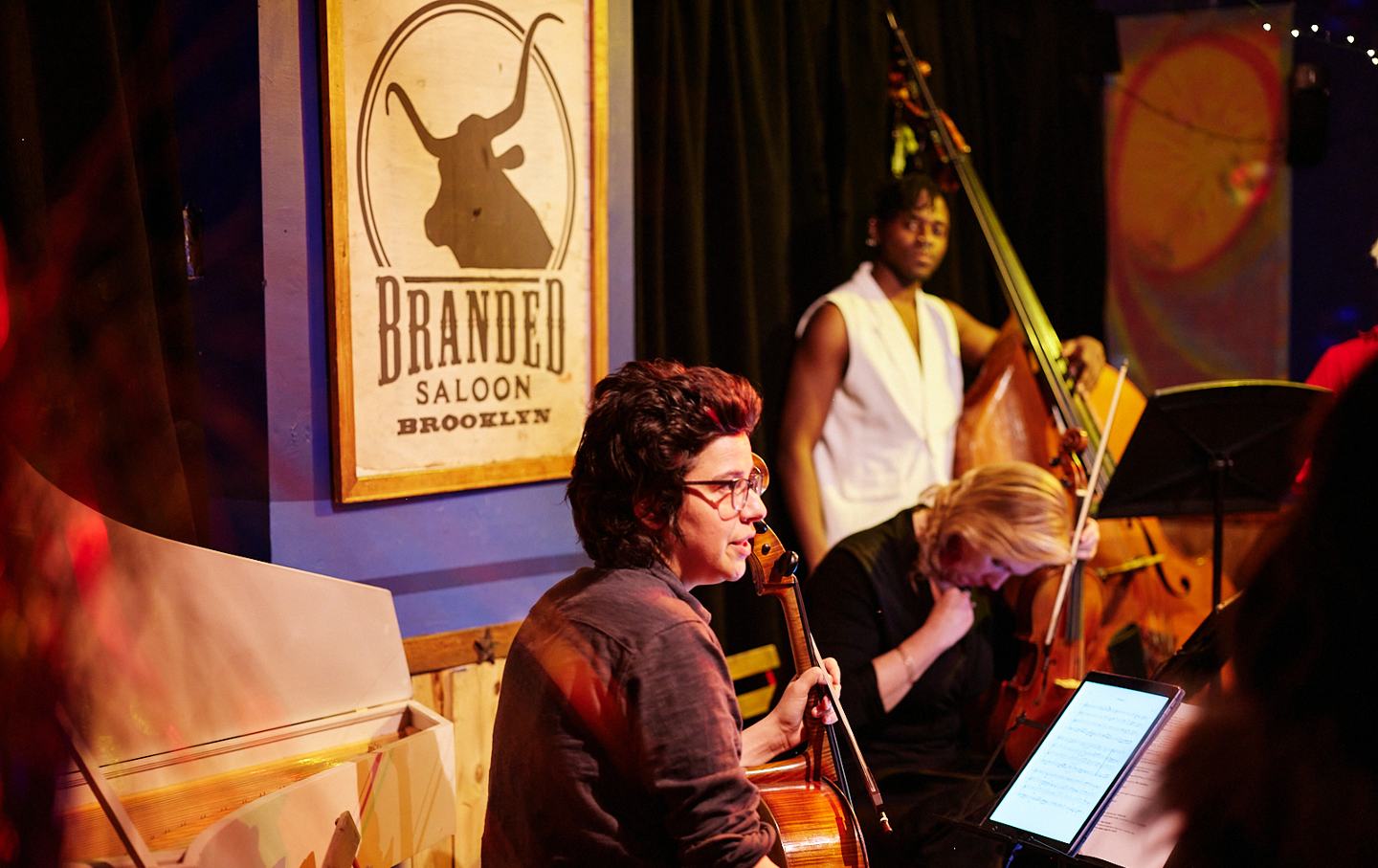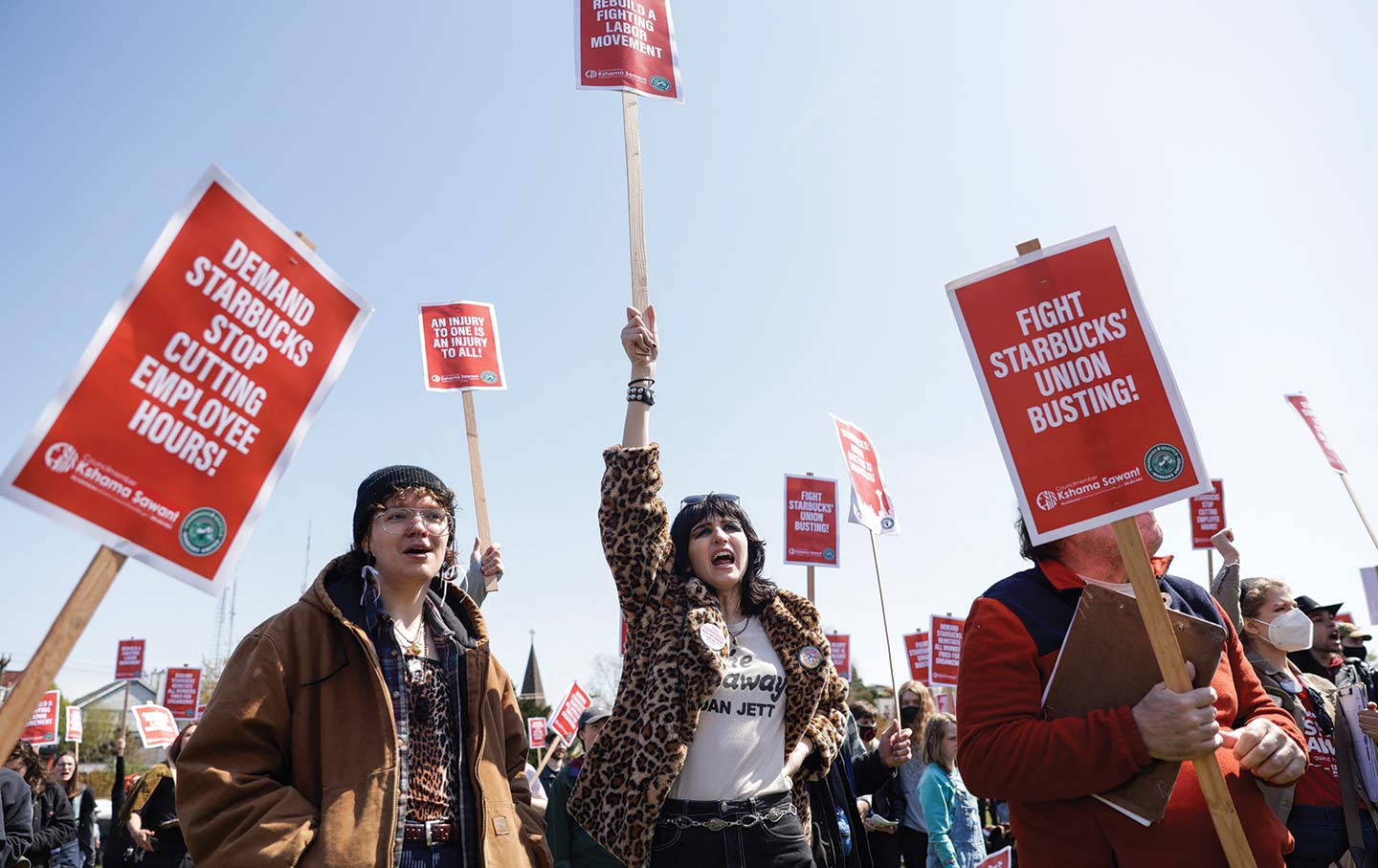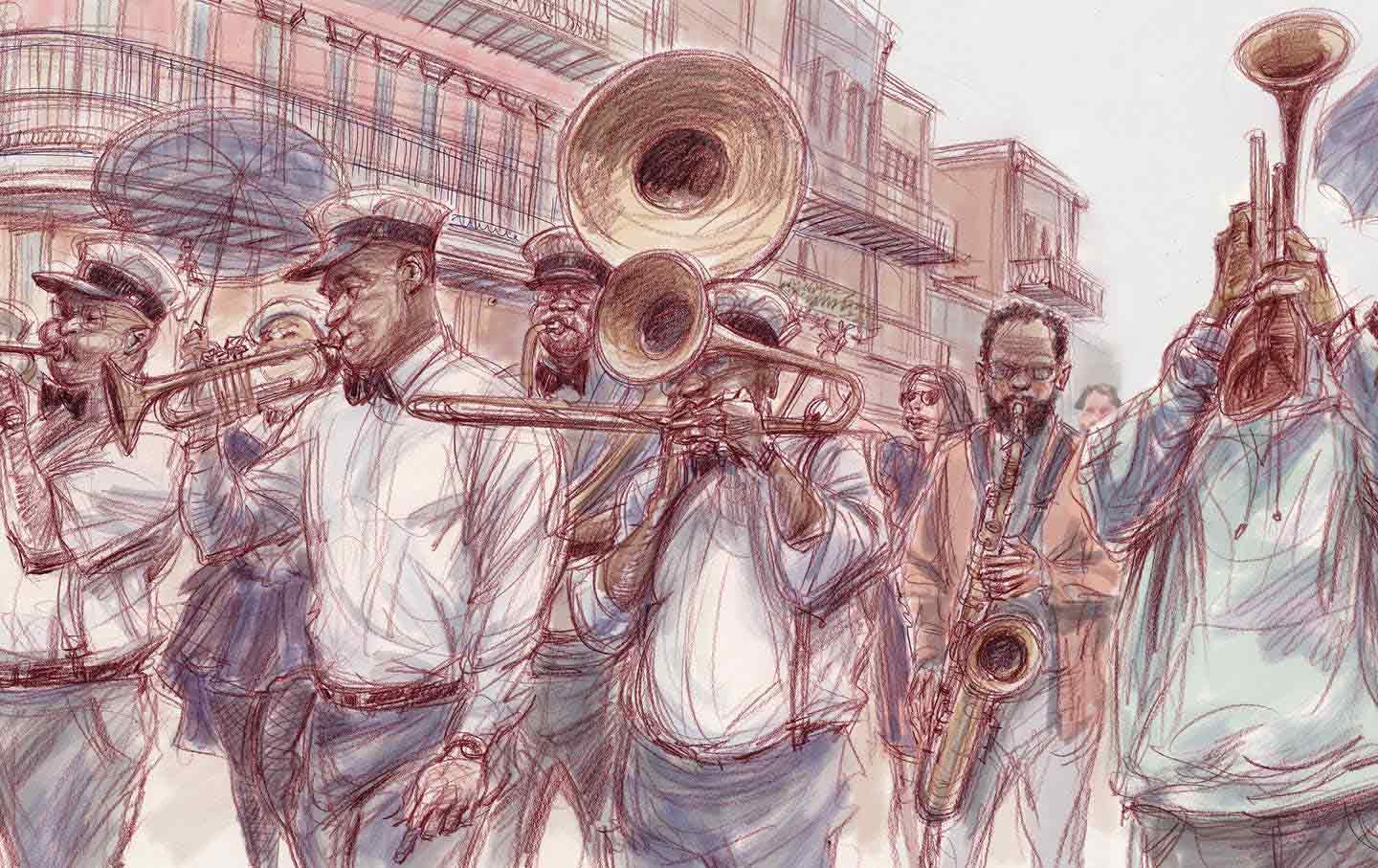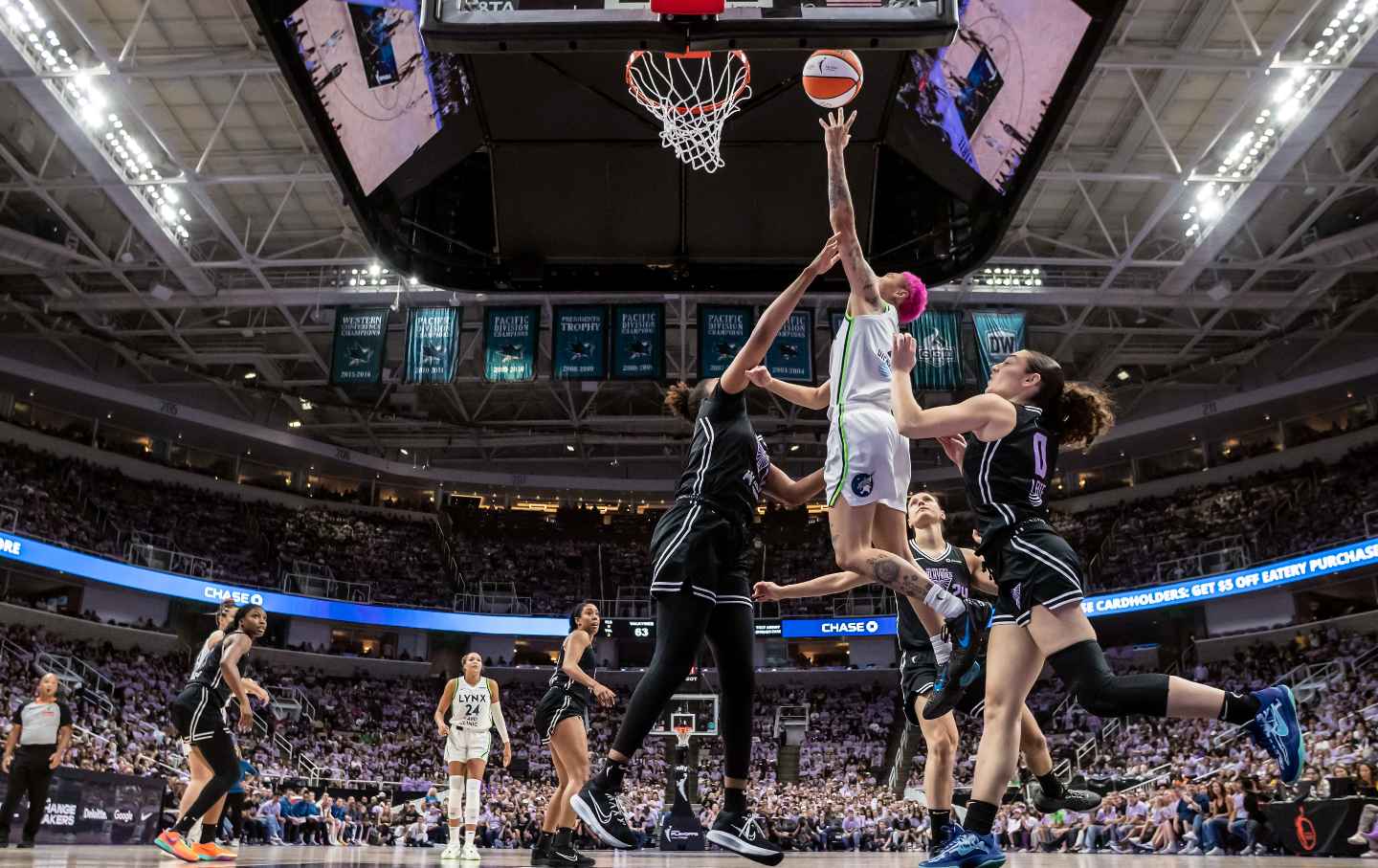The Future of Classical Music Is Queer
There’s a new vitality in the classical music scene—and it would simply not exist without the creativity and support of queer people.

A ChamberQUEER performance at Branded Saloon in Brooklyn.
(Courtesy of Jules Biber)Picture this: The back room of Branded Saloon, a queer bar in Brooklyn, is filled to capacity. Beer sloshes as a server raises a tray high above the crowd. People in rainbow masks stand on Doc Marten–ed toes to catch a glimpse of the stage. But there isn’t a guitar or a drum set in sight.
Instead, violinist Rafa Prendergast and cellist Jules Biber play Arcangelo Corelli’s “La Folia” variations to hoots and hollers. A merch table sells T-shirts that say, “We’re here. We’re ChamberQUEER. Get Used to it.”
To some—especially queer classical music lovers—this may sound like a utopian dream. But the concert, titled “Baroqueer,” was very real—and took place on a Tuesday evening back in March, as part of ChamberQUEER, a year-round series championing queer classical performers and composers.
People are obsessed with the idea that “classical music is dying.” If you throw these terms into Google, you’ll get a whole host of results, including ones from Slate and the New York Times opinion section.
But what would it even mean for classical music to be “dying”? If anything, classical is merging with other genres. With pop, with rock, with cabaret, with drag, with jazz. And that renewed vitality would simply not exist without the creativity and support of queer people.
This is an opinion I’ve formed through writing Poison Put to Sound, a blog about classical music and queerness. Since starting Poison in September of 2022, I’ve attended roughly 50 queer classical concerts—mostly across New York’s “high” and “low” stages—and spoken with many musicians, 11 of whom appear here.
From those conversations, I’ve established this tenet: The cutting-edge of classical music is fluid. It is gender fluid. It is genre-fluid. And it’s unmistakably queer.
What does “queering” classical music look like? It looks like anachronism, hybridity, intersectionality, reclaiming the canon. That’s what ChamberQUEER embodies. Biber—who cofounded ChamberQUEER in 2018 with soprano Danielle Buonaiuto, baritone Brian Mummert, and cellist Andrew Yee—says they were “stunned” by Baroqueer’s turnout.
But maybe Biber shouldn’t have been so stunned. Because while people mistakenly think there’s a “stiffness or formalness” to Baroque, it’s actually “one of the freest eras of music making,” says Biber. And anyway, queerness is built into the very foundations of Baroque—and, for that matter, of classical music itself.
Baroque “can be so experimental, excessive, crazy, over the top, improvisatory, and it didn’t take itself too seriously.” Besides, “people wearing wigs and tights and high heels. It’s so gay.”
Though Yee is less involved with ChamberQUEER these days—especially after becoming a first-time mother—she maintains an active schedule as founding cellist of the Attacca Quartet.
She also has a solo show titled Halfie—consisting of original and commissioned pieces—that is “more of a band name than an actual program,” she says, while her son, Oatie, sleeps on her chest. “It’s something that has evolved. It started as a conversation between being biracial and nonbinary. Now, I’m trans. How does that change the tidiness of my original intent?”
Always questioning the status quo, Yee plays without an endpin— the metal rod that sticks out the bottom of the instrument—which has little to no effect on sound, but is considered standard among modern players.
“The endpin was a great invention, but I think it went unobserved,” says Yee. “It became the norm. It must be 11 inches, it must be at this angle, etc. It became as essential as the bow, and that’s just not true.”
When I saw Halfie more than a year ago, Yee wore a coral-colored dress with matching nails, grasping the cello between her legs, as she recited “The Sea As It Is,” her own composition about Jacob Riis Beach. During the pandemic, Yee was inspired to compose by Caroline Shaw, the youngest-ever winner of the Pulitzer Prize in music. “We’re in a bit of a boom for new classical music,” says Yee. “It’s bringing back the era of the composer-performer, which has been lost for so long.”
For her part, Shaw says queer “can mean a lot of things.”
“Both my sexuality, as well as embracing the idea that things can look different than the way I was taught,” she says. At the Attacca concerts, for example, “They don’t look like the usual classical music audience.” Shaw says that “classical” is “an imperfect term, useful as a quick gloss for something.” (In that way, she adds, it is kind of like the word “queer.”)
Popular
“swipe left below to view more authors”Swipe →Shaw recently worked on a Concerto for Harpsichord and Strings with Byron Schenkman, the artistic director of Seattle-based Sound Salon. “It sounds like if Jane Austen took mushrooms and had a little tryst,” she jokes.
Shaw was the perfect match for Schenkman, who has called the harpsichord a “queer piano.” “There’s something mystical about being queer,” says Schenkman. “And there’s something mystical about being drawn to instruments and repertory from far away and long ago.”
Schenkman started studying early music when they were 17. “I was delighted by the idea of being a ‘happy homosexual harpsichordist,’” they say. “I had the idea that pianists were mostly Jewish and only harpsichordists could be gay. Now I’m glad to be a queer Jewish musician who performs on piano, harpsichord, and everything in between.”
An arguably even gayer instrument is the flute, which is “always given these flamboyant and lively and playful passages,” says Brandon Patrick George. “It’s written into the repertoire.”
In 2018, George replaced flutist Valerie Coleman of the groundbreaking Imani Winds. His new album, Twofold ,is about works in conversation, across time and identity. George says he first picked the flute because he identified with its sound.
“We are sometimes drawn to an instrument because we think, if there were music to the voice in our head, it would sound like that,” he says. “When I came out.… Music allowed me to time travel, in a sense. I left my current environment, with whatever turmoil there might have been, and was transported to a time which, at least from the paintings we see, had a lot of opulence and beauty. When I was a student learning about the Baroque era, I came across Frederick the Great, who was known for extravagance, and for composing for the flute, and was very, very queer.”
Things came full circle when George did a talk about the 18th-century Prussian king “in front of his gay and glamorous snuff box” at the Metropolitan Museum.
The Baroque era, with its “Queerococo” extravagance, was also an inspiration for Opera Lafayette’s production of Rameau’s Io, with fabulous costumes by drag queen Machine Dazzle.
Keats Dieffenbach—whose buzz cut signals more punk band than Baroque opera—was playing violin in the pit. “I’ve always been hybrid in a lot of ways,” they say.
There’s an aspect of “Queer Time”—a theory rejecting heteronormative temporality—to Dieffenbach’s trajectory. They came out as bisexual at 32, and—well after establishing themself as a modern violinist—applied to the Juilliard historical performance program at 34. “Early music, by definition, challenges established norms in mainstream classical music,” they say. It comes as no surprise that that world is so queer. It’s counterculture of a different kind.
Dieffenbach has also noticed parallels between their gender journey and the restoration of musical instruments: “I’ve found so much about transition is about a return to something that we’ve forgotten or neglected about ourselves,” they say.
It’s a concept familiar to Aiden Feltkamp, whose Instagram handle is “@transcherubino,” in reference to a famous pants role (the term for a female singer plays a male character in opera). “When I started testosterone, I knew I would be depressed about not being able to sing,” says Feltkamp, who has gone from mezzo to bass-baritone. “I thought: What are some other things that I can do to be involved in opera that I enjoy?”
The answer was libretto writing. They say their neurodivergence— in addition to queerness—contributes to the fantastical subjects of their operas: “It’s why I like sci-fi so much, these robots and aliens.”
Feeling “alien” is familiar to countertenor Anthony Roth Costanzo.
For the Metropolitan Opera’s production of Philip Glass’s Akhnaten ,Costanzo researched the opera’s titular, possibly intersex, character.
“I talked to Egyptologists, and Richard Parkinson put forth the idea that the Sun God was not a man or a woman, but the unification of man and woman,” he says. “As the pharaoh tried to come closer to God, he became more like both man and woman. I said OK, there is an entire queer narrative to Akhnaten, and I want to put that forward.”
In Akhnaten’s opening scene, Costanzo is naked and totally hairless. There’s a TikTok of him getting a full-body wax for the role—a kind of transformation.
Costanzo is currently working on a book, titled Countertenor, about this highest-of-male-voice-types. Often cast as “gods and monsters,” there’s this idea that “we are so other, we can only play the other.” This otherness, Costanzo says, stems from “sounding different than how I look. I built an entire career from not fitting into the mainstream.”
But “in a way, voices aren’t gendered,” says Costanzo. “When I was younger, I called myself a male soprano. There’s also this term: sopranist. In theory, a man could be a mezzo. Anyone could be.”
“Opera is long the domain of queerness since its inception,” he continues.
Why opera? Composer Matthew Aucoin writes in The Impossible Art that opera is the combination of music, writing, theater, fashion, and dance—giving it, perhaps, even more potential for intersectionality, especially with regards to queerness.
“Inherent to opera has always been this notion of the mask, it is an art form of illusions,” says Aucoin. “Throwing your voice, disguising yourself, speaking in a way that goes beyond traditional notions of gender. Until recently, the mask or the illusion was integral—there was no way to express these things except for the mask.”
Aucoin’s first opera, The Crossing ,was about Walt Whitman. He also presented Eurydice at the Met, with a libretto by Sarah Ruhl. In it, he gave the leading man a queer-coded countertenor “double.” “It felt clear that the Orpheus of Sarah’s play was not the whole picture of who Orpheus is,” says Aucoin. “There had to be this overtone hanging in the air, this sense of mystery and otherness.”
A sense of otherness also resonates with tenor Russell Thomas, though he has had to approach the opera world from a different perspective than Aucoin. “Queer isn’t a word I use often,” he says. “The only sexuality-specific interview I had was with The Advocate. I often find myself answering questions solely about being Black.”
Regarding Fire Shut Up in My Bones and Champion—two operas by Terence Blanchard with Black, bisexual protagonists—“I like seeing these stories being told. But I wonder if there are other stories, or more potent stories. There was an opera about Stonewall, but it was mostly white people.”
Thomas collaborated with countertenor John Holiday—another queer, Black singer—on Vanished, an adaptation of a song cycle by Leoš Janáček for Dallas Opera. “I’ve always wanted to do [the love story] from a queer perspective,” says Thomas. “It’s one of the things I’m most proud of.”
Just as Thomas has a tenuous relationship with the word “queer,” so do some musicians with “classical.” Mantawoman is a London-based yangqin—or Chinese dulcimer—player who has performed with the Silk Road Project.
Soon after the pandemic, she says, “I posted my first drag video: a duet between my boyish self playing yangqin and Mantawoman lip-syncing Madison Beer’s ‘Boyshit’ as a takedown of toxic masculinity.” Since then, her drag “avatar” has taken over. “I like the term ‘genre-fluidity’ because it captures a sentiment that feels important to our generation,” she says.
Mantawoman says she sometimes feels it’s time to “break up” with classical music. Numerous experiences have contributed to this: Being disqualified from a concerto competition because the judges “didn’t know how to compare Rachmaninoff and yangqin.” Being told on tour to wear “boys’ clothes” so as “not to make conservative patrons uncomfortable.”
“Also, colonialism in classical music is not talked about nearly enough,” she says.
To Mantawoman, someone like Yo-Yo Ma, with such an intense fandom, could just as easily be considered a pop star as they could a classical performer. “I watched someone come up to him after a concert and cry her eyes out talking about how much his recordings changed her life.”
For someone like Shaw, the term “classical” is a useful approximation. For Mantawoman, the term no longer serves her—like a dead name.
But it is in this apparent paradox—contradiction being an integral part of the queer experience—that the future of classical music sits. That something can be both “dying” and thriving at the same time.
Disobey authoritarians, support The Nation
Over the past year you’ve read Nation writers like Elie Mystal, Kaveh Akbar, John Nichols, Joan Walsh, Bryce Covert, Dave Zirin, Jeet Heer, Michael T. Klare, Katha Pollitt, Amy Littlefield, Gregg Gonsalves, and Sasha Abramsky take on the Trump family’s corruption, set the record straight about Robert F. Kennedy Jr.’s catastrophic Make America Healthy Again movement, survey the fallout and human cost of the DOGE wrecking ball, anticipate the Supreme Court’s dangerous antidemocratic rulings, and amplify successful tactics of resistance on the streets and in Congress.
We publish these stories because when members of our communities are being abducted, household debt is climbing, and AI data centers are causing water and electricity shortages, we have a duty as journalists to do all we can to inform the public.
In 2026, our aim is to do more than ever before—but we need your support to make that happen.
Through December 31, a generous donor will match all donations up to $75,000. That means that your contribution will be doubled, dollar for dollar. If we hit the full match, we’ll be starting 2026 with $150,000 to invest in the stories that impact real people’s lives—the kinds of stories that billionaire-owned, corporate-backed outlets aren’t covering.
With your support, our team will publish major stories that the president and his allies won’t want you to read. We’ll cover the emerging military-tech industrial complex and matters of war, peace, and surveillance, as well as the affordability crisis, hunger, housing, healthcare, the environment, attacks on reproductive rights, and much more. At the same time, we’ll imagine alternatives to Trumpian rule and uplift efforts to create a better world, here and now.
While your gift has twice the impact, I’m asking you to support The Nation with a donation today. You’ll empower the journalists, editors, and fact-checkers best equipped to hold this authoritarian administration to account.
I hope you won’t miss this moment—donate to The Nation today.
Onward,
Katrina vanden Heuvel
Editor and publisher, The Nation
More from The Nation

Breaking the LAPD’s Choke Hold Breaking the LAPD’s Choke Hold
How the late-20th-century battles over race and policing in Los Angeles foreshadowed the Trump era.

Mayor of LA to America: “Beware!” Mayor of LA to America: “Beware!”
Trump has made Los Angeles a testing ground for military intervention on our streets. Mayor Karen Bass says her city has become an example for how to fight back.

Organized Labor at a Crossroads Organized Labor at a Crossroads
How can unions adapt to a new landscape of work?

The Epstein Survivors Are Demanding Accountability Now The Epstein Survivors Are Demanding Accountability Now
The passage of the Epstein Files Transparency Act is a big step—but its champions are keeping the pressure on.

The Fight to Keep New Orleans From Becoming “Everywhere Else” The Fight to Keep New Orleans From Becoming “Everywhere Else”
Twenty years after Katrina, the cultural workers who kept New Orleans alive are demanding not to be pushed aside.

The WNBA Makes More Money Than Ever. What About the Players? The WNBA Makes More Money Than Ever. What About the Players?
WNBA players receive around 10 percent of league revenue compared to the NBA’s 51 percent. With their bargaining agreement expiring in January, players want to share in the growth...


